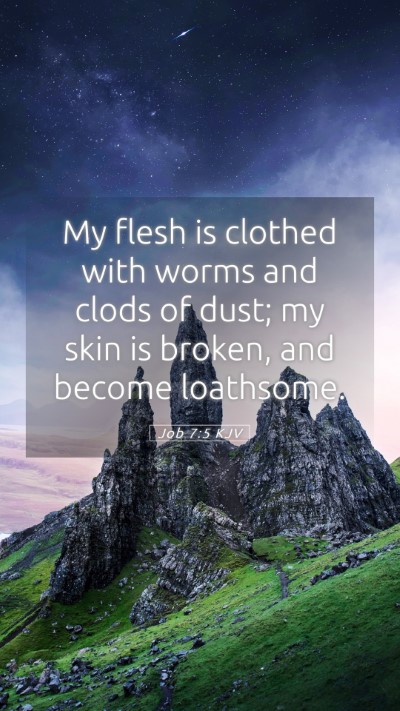Old Testament
Genesis Exodus Leviticus Numbers Deuteronomy Joshua Judges Ruth 1 Samuel 2 Samuel 1 Kings 2 Kings 1 Chronicles 2 Chronicles Ezra Nehemiah Esther Job Psalms Proverbs Ecclesiastes Song of Solomon Isaiah Jeremiah Lamentations Ezekiel Daniel Hosea Joel Amos Obadiah Jonah Micah Nahum Habakkuk Zephaniah Haggai Zechariah MalachiJob 7:5 Meaning
What is the meaning of Job 7:5?
My flesh is clothed with worms and clods of dust; my skin is broken, and become loathsome.
Job 7:5 Bible Verse Meaning
Bible Verse Commentary: Job 7:5
Job 7:5 states, "My flesh is clothed with worms and dust; my skin is broken, and it is festering." This verse, part of Job's lament, highlights his intense suffering and despair during his trials. To fully understand this verse, we can look at insights from various public domain commentaries.
Understanding the Context
Job, a man described as blameless and upright, finds himself in a position of deep anguish. He has lost his children, his wealth, and is now afflicted with painful sores. In this context, his lamentation serves as a profound expression of human pain and existential questioning.
Insights from Public Domain Commentaries
- Matthew Henry's Commentary: Henry explains that Job’s words illustrate a state of utter helplessness. He uses vivid imagery to convey the terrible condition of his body, which reflects the degradation of his spirit. Henry notes that Job's physical suffering mirrors his emotional and spiritual turmoil. Job feels that his life is deteriorating, not just in the physical sense but also in a broader existential context.
- Albert Barnes' Notes: Barnes emphasizes the biological decomposition that Job describes. The mention of "worms" can be seen as a symbol of mortality and decay, suggesting that Job feels trapped in a cycle of death and despair. Barnes highlights the importance of recognizing the dual nature of this suffering—physical and emotional—as Job grapples with the seeming abandonment of God in his plight.
- Adam Clarke's Commentary: Clarke provides a detailed linguistic analysis, indicating that the Hebrew terms used convey not just physical pain, but also a sense of deep loneliness and isolation. Clarke interprets Job’s questions as a yearning for God’s presence, suggesting that the physical affliction intensifies his spiritual desolation. The essence of Job's cry is one of seeking understanding in his suffering.
Deeper Meaning of the Verse
This verse serves multiple purposes within the narrative of Job:
- Illustration of Pain: It underscores the depth of Job's agony, inviting readers to empathize with his plight.
- Existential Reflection: It poses significant questions about suffering and humanity's relationship with God.
- Symbolism of Decay: The imagery of 'worms' evokes thoughts of mortality, reminding us of human frailty and the inevitable fate of death.
Application for Today
For readers engaging in bible study, this verse can prompt reflections on personal suffering and the search for meaning in difficult times. Here's how one might apply these insights:
- Recognizing the shared human experience of pain and discomfort.
- Understanding the importance of community and support in times of suffering.
- Seeking God’s presence during challenging moments.
Cross References
- Psalm 22:15 – Another expression of physical suffering and despair.
- Ecclesiastes 12:7 – Reflection on the inevitability of death and the return of the spirit to God.
- 2 Corinthians 4:16-18 – A New Testament perspective on outer decay versus inner renewal.
Conclusion
Job 7:5 encapsulates profound themes of suffering, mortality, and divine silence. By examining the verse through the lens of various commentaries, readers can gather valuable Bible study insights that speak to both the historical context and the timeless human experience of grappling with pain. This verse challenges us to explore the meaning of Bible verses deeply, offering a framework for understanding our own struggles and the broader mystery of faith.


